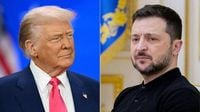In a significant development in the ongoing conflict between Ukraine and Russia, the United States and Ukraine have signed a broad economic agreement in Washington, D.C., on April 30, 2025. This agreement establishes an investment fund aimed at the reconstruction of Ukraine, which has been under relentless Russian attacks since the conflict escalated three years ago. The deal also grants the Trump administration access to Ukraine's natural resources, a move that has been met with mixed reactions from various stakeholders.
Ukrainian President Volodymyr Zelensky hailed the agreement as "truly equitable," emphasizing that it creates substantial investment opportunities for Ukraine. During his daily address, Zelensky stated, "The agreement has changed significantly during the preparation process. It is now a genuinely fair agreement that creates significant investment opportunities in Ukraine." This sentiment reflects the optimism surrounding the deal, especially as it comes at a time when Ukraine is in dire need of reconstruction funds.
However, the Kremlin's response has been notably muted. As of May 1, 2025, there has been no official reaction from Moscow regarding the agreement. Russian media, however, have been vocal in downplaying its significance. One prominent television channel described the treaty as "vague" and questioned what the Americans would gain from it. Another journalist remarked, "Despite the fanfare and trumpets, if the fighting continues in Ukraine, this agreement is worthless." Such sentiments echo the skepticism prevalent in Russian circles regarding the effectiveness of the partnership between the U.S. and Ukraine.
Adding to the complexity of the situation, former Russian President Dmitry Medvedev has suggested that the American "deep state" is at war with Donald Trump, hinting at the intricate political dynamics at play. He noted that the U.S. might impose new sanctions against Russia, stating, "The month of May begins in turmoil. And certainly not in peace..." This statement underscores the escalating tensions as both sides navigate the geopolitical landscape.
In conjunction with the signing of the economic agreement, Russian President Vladimir Putin announced a ceasefire on the front in Ukraine from May 8 to May 10, 2025, coinciding with the 80th anniversary of the victory over Nazi Germany. However, he warned that Moscow would retaliate if Ukraine violated this truce. This announcement has been met with skepticism by Ukrainian officials, including Zelensky, who denounced it as a "manipulation attempt." He argued that the ceasefire should not be used as a tactic to gain a strategic advantage during the commemorative events in Moscow.
In a parallel development, the United States has urged both Russia and Ukraine to present "concrete proposals" to end the war. Secretary of State Marco Rubio warned that if no progress is made, the U.S. would cease its mediation efforts. This call for actionable steps reflects the growing impatience among U.S. officials regarding the ongoing conflict.
Meanwhile, the humanitarian situation continues to deteriorate. A recent Ukrainian drone strike resulted in the deaths of at least seven individuals and injured over 20 in the Russian-controlled city of Olechky. This incident highlights the ongoing violence that plagues the region, despite diplomatic efforts aimed at establishing peace.
On the economic front, Zelensky's government is also focused on securing international support for its reconstruction efforts. The newly established investment fund will be financed and managed equally by both Ukrainian and American stakeholders. Key provisions of the agreement stipulate that full ownership and control of resources remain with Ukraine, ensuring that the Ukrainian government determines extraction processes. This aspect of the agreement was emphasized by Ukrainian Economy Minister Ioulia Svyrydenko, who detailed the main provisions on social media.
The fund is projected to attract global investments, particularly in the extraction of minerals, oil, and gas. Svyrydenko noted that 50% of revenues from new licenses in critical materials and energy sectors will be allocated to the fund, which aims to bolster Ukraine's economic recovery.
Despite the optimism surrounding the agreement, concerns persist regarding the lack of concrete security guarantees for Ukraine. The Washington Post reported that while the agreement affirms a "long-term strategic alignment" between the U.S. and Ukraine, it does not provide specific security assurances. This gap in the agreement has raised eyebrows among analysts and policymakers, who fear that without solid guarantees, Ukraine's security remains vulnerable.
In the backdrop of these developments, the international community is closely monitoring the situation. European nations are preparing to impose new sanctions against Russia if it continues to reject ceasefire proposals. French Foreign Minister Jean-Noël Barrot has indicated that the Europeans are coordinating their efforts with the United States to ensure a unified response to Russia's actions.
As the conflict continues, the humanitarian crisis deepens. The United Nations has announced a reduction in its humanitarian ambitions in Ukraine due to a significant decrease in funding. The UN plans to focus its efforts on the most vulnerable populations, indicating that without increased support, vital assistance will be compromised.
In conclusion, the recent agreement between the United States and Ukraine marks a pivotal moment in the ongoing conflict, with potential implications for both nations. While the deal has been met with optimism in Ukraine, skepticism remains in Russia. As the situation evolves, the international community will be watching closely to see if this agreement can pave the way for a lasting resolution to the conflict.




